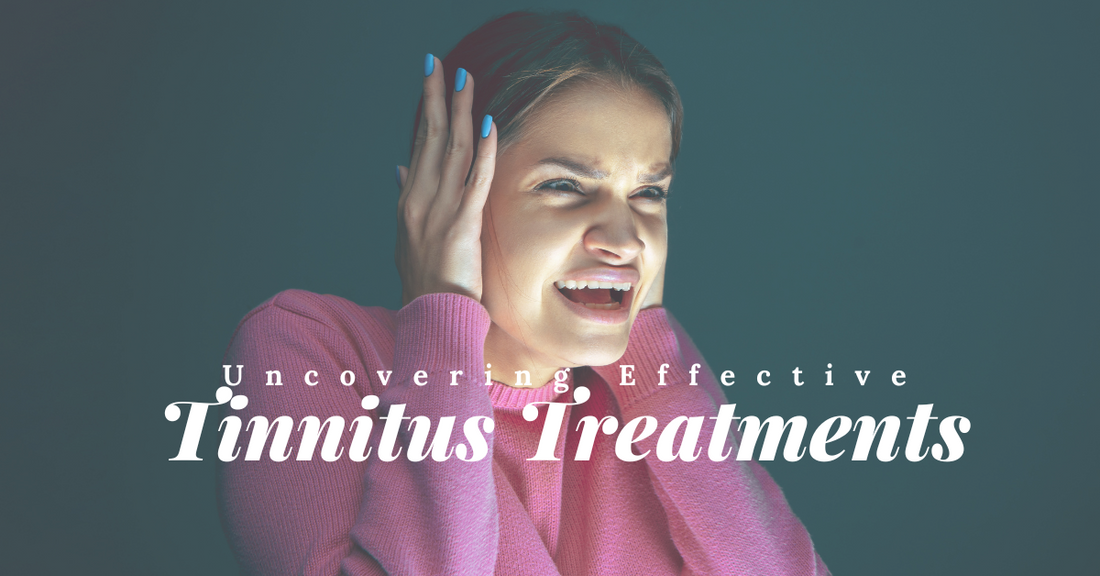
Uncovering Effective Tinnitus Treatments
Share
Is tinnitus ringing, buzzing, or hissing in your ear? Tinnitus may seriously disrupt your peace and the quality of life you used to enjoy, but better days are ahead. This article will present to you various treatments, from masking the symptoms to a solution targeting root causes. Discover from leading-edge medical therapies to home-based remedies for overcoming it. Dive into this comprehensive guide on tinnitus treatments and learn how to tune out the noise for good. Your relief starts here.

Let's have a look at some of these treatment options:
1. Sound Therapy:
- White Noise Machines: These devices produce a consistent sound that can help drown out tinnitus and make it less bothersome.
- Hearing Aids: For those with hearing loss, hearing aids can amplify external sounds, reducing the contrast between external noises and tinnitus.
- Customised Sound Therapy: You can use the sounds that match your tinnitus to help your brain get used to it and make it less annoying.
2. Medications:
- Antidepressants and antianxiety medications: These can be prescribed to manage the emotional effects of tinnitus, but they don't help in curing the situation itself.
- Medication for Underlying Conditions: Treating conditions that might be contributing to tinnitus, such as high blood pressure or infections, can sometimes alleviate symptoms.
3. Lifestyle Changes:
- Stress Management: Techniques such as meditation, yoga, or deep breathing exercises can reduce stress, which may in turn reduce the perception of tinnitus.
- Diet and Exercise: Maintaining a healthy diet and regular exercise can improve overall health and potentially reduce tinnitus symptoms.
4. Hearing Protection
- Earplugs: Using earplugs in noisy environments can help prevent tinnitus from worsening due to loud noises.
5. Alternative Therapies
- Acupuncture: Some people find relief through acupuncture, though the scientific evidence for this is limited.
- Herbal supplements: supplements like Ginko, biloba, Gushan Pian, and zinc have been used for tinnitus relief, but their effectiveness is still under review.
6. Medical and surgical interventions:
- Cochlear Implants: Cochlear implants may provide relief for severe cases of tinnitus associated with profound hearing loss.
- Surgical options: In rare cases, surgical interventions might be considered if specific structural issues, such as vascular abnormalities, cause tinnitus.
7. Educational and Support Resources:
- Tinnitus Support Groups: Connecting with others with tinnitus can provide emotional support and practical advice.
- Education and Counselling: Learning more about tinnitus and its management can empower you to handle the condition more effectively.
Table of Contents
Tinnitus Treatment In Ayurveda

Ayurveda is a holistic tinnitus treatments, as it maintains the doshas in the body, Pitta and Vata. Pitta is responsible for heat and inflammation, while Vata governs dryness and irregularities. Herbal remedies, diet, and therapies can help Ayurvedic tinnitus treatments reach the root cause and thus provide a natural and effective solution for long-lasting relief. The key aspects of Ayurvedic treatment are outlined below:
- To identify dosha imbalances, practitioners evaluate overall health using pulse diagnosis, observation, and examination of the tongue and skin.
- Treatment approaches:
- A tailored diet is recommended, emphasising cooling and hydrating foods while avoiding spicy and salty items that may aggravate Pitta.
- Regular sleep and stress-management techniques such as yoga and meditation are recommended.
- Herbs like Brahmi, Shankhpushpi, Ashwagandha, and Triphla are used to balance the doshas and relieve symptoms.
- Panchakarma therapies, which include Shirodhara, Nasya, and Abhyanga, are detoxification treatments that help to restore balance.
- For ear care, specific treatments such as karnapooranam (herbal oil in the ear) and cooling compresses are used.
- Mind-body connection, meditation, and yoga emphasise mental and emotional well-being.
- It is critical to consult with a qualified Ayurvedic practitioner to develop personalised treatment plans based on individual dosha imbalances.
In conclusion, Ayurvedic tinnitus treatments are a comprehensive approach that combines dietary changes, lifestyle changes, herbal medicines, and targeted therapies to address the underlying causes of the condition.
Pulsatile Tinnitus Treatment
Pulsatile tinnitus is basically when you hear rhythmic sounds that align or sync up with your heartbeat. It can happen due to various underlying causes, including blood vessel abnormalities, increased blood flow, or ear-related changes. Treatment typically focuses on addressing the root cause, which may include:
- Identifying any underlying issues, such as blood vessel problems or ear infections, that may require medication, surgery, or other treatments.
- There are no specific medications for pulsatile tinnitus, but managing associated conditions such as high pressure and using hearing aids for any hearing loss can help.
- White noise machines can help drown tinnitus sounds, and wearing ear protection can reduce exposure to loud noises.
- Cognitive Behavioural Treatment (CBT) and Tinnitus Returning Therapy (TRT) can help you deal with the emotional side of tinnitus and become accustomed to the sounds.
- If you have specific physical issues, surgery may be an option after trying other treatments.
- Some people prefer acupuncture or herbal supplements like ginkgo and biloba, but their effectiveness varies, so it is important to consult with a healthcare provider about it.
Tinnitus can be Cured

Tinnitus can be treated to a great extent in some cases, depending on what is causing it. In certain cases, the problem lies in issues such as ear infections, hearing loss, or stress, which can be treated by directly targeting the problem. Proper identification of the root problem is the key to an appropriate solution.
Sound therapy, hearing aids, and behavioural therapy have been included among the tinnitus treatments that help reduce symptoms. Natural healing, including Ayurveda, diet, and managing stress, may also help restore one's health. Each case may not be treated; however, a combination of treatments to an individual's needs might greatly enhance the quality of life while minimizing the effects of tinnitus.
Conclusion
In the end, the best treatment is what works for you. Exploring these various treatments can help you find the most effective approach for managing your tinnitus. It often requires a combination of methods tailored to individual needs and preferences. Consulting with a healthcare professional specialising in tinnitus is crucial to developing a personalised treatment plan.
Frequently Asked Questions:
1. What is the best treatment for tinnitus?
The best treatment for tinnitus is a personalised one that’s best suited for you. It may require a combination of approaches like sound therapy, behavioural therapies, and stress management. It is advisable to consult healthcare professionals who specialise in tinnitus and help decide the best treatment suited for you.
2. What is the simple trick to stop tinnitus?
There is no universal cure for tinnitus, but there are several methods that can help alleviate symptoms, including white noise therapy, mindfulness and relaxation techniques, avoiding triggers like caffeine or alcohol, using earplugs, eating a balanced diet and staying hydrated, ear massage, and regular sleep.
3. Can I live a normal life with tinnitus?
Yes, many people with tinnitus live normal, fulfilling lives. While tinnitus can be difficult and even distressing, it can often be effectively managed with the right strategies and support. If tinnitus is significantly affecting your daily life, seeking help from a healthcare professional is important to develop a personalised approach to management and treatments.
